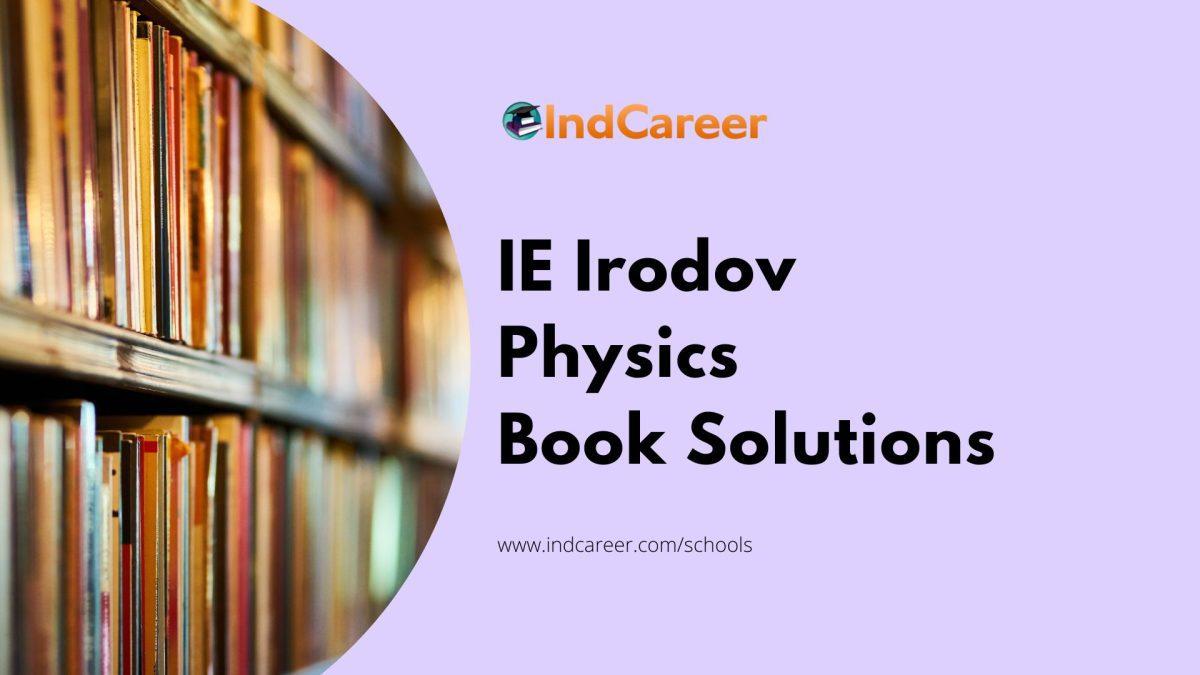I. E. Irodov, or Igor Evgenyevich Irodov, was a Russian physicist renowned for his contributions to the field of theoretical physics. He authored the book “Problems in General Physics” as a resource for students and physics enthusiasts to hone their problem-solving skills. Let’s delve into the intricacies of this remarkable book.
In this comprehensive article, we will embark on a journey through the world of I.E. Irodov’s book solutions.
IE Irodov Book Solutions
In the world of physics education, I.E. Irodov’s book stands as a beacon of knowledge and challenge. Its intricate problems, coupled with detailed solutions, have transformed countless physics enthusiasts into adept problem solvers. Whether you’re a student preparing for exams or a physics aficionado seeking intellectual stimulation, I.E. Irodov’s book solutions are a treasure trove waiting to be explored.
| PART ONE. PHYSICAL FUNDAMENTALS OF MECHANICS |
|---|
| 1.1. Kinematics |
| 1.2. The Fundamental Equation of Dynamics |
| 1.3. Laws of Conservation of Energy, Momentum, and Angular Momentum |
| 1.4. Universal Gravitation |
| 1.5. Dynamics of a Solid Body |
| 1.6. Elastic Deformations of a Solid Body |
| 1.7. Hydrodynamics |
| 1.8. Relativistic Mechanics |
| PART TWO. THERMODYNAMICS AND MOLECULAR PHYSICS . |
|---|
| 2.1. Equation of the Gas State. Processes |
| 2.2. The First Law of Thermodynamics. Heat Capacity |
| 2.3. Kinetic Theory of Gases. Boltzmann’s Law and Maxwell’s Distribution |
| 2.4. The Second Law of Thermodynamics. Entropy |
| 2.5. Liquids. Capillary Effects |
| 2.6. Phase Transformations |
| 2.7. Transport Phenomena |
| PART THREE. ELECTRODYNAMICS |
|---|
| 3.1. Constant Electric Field in Vacuum |
| 3.2. Conductors and Dielectrics in an Electric Field |
| 3.3. Electric Capacitance Energy of an Electric Field |
| 3.4. Electric Current |
| 3.5. Constant Magnetic Field. Magnetics |
| 3.6. Electromagnetic Induction. Maxwell’s Equations |
| 3.7. Motion of Charged Particles in Electric and Magnetic Fields |
| PART FOUR. OSCILLATIONS AND WAVES |
|---|
| 4.1. Mechanical Oscillations |
| 4.2. Electric Oscillations |
| 4.3. Elastic Waves. Acoustics |
| 4.4. Electromagnetic Waves. Radiation |
| PART FIVE. OPTICS |
|---|
| 5.1. Photometry and Geometrical Optics |
| 5.2. Interference of Light |
| 5.3. Diffraction of Light |
| 5.4. Polarization of Light |
| 5.5. Dispersion and Absorption of Light |
| 5.6. Optics of Moving Sources |
| 5.7. Thermal Radiation. Quantum Nature of Light |
| PART SIX. ATOMIC AND NUCLEAR PHYSICS |
|---|
| 6.1. Scattering of Particles. Rutherford-Bohr Atom |
| 6.2. Wave Properties of Particles. Schrodinger Equation |
| 6.3. Properties of Atoms. Spectra |
| 6.4. Molecules and Crystals |
| 6.5. Radioactivity |
| 6.6. Nuclear Reactions |
| 6.7. Elementary Particles |
Benefits of Engaging with Irodov’s Book
Sharpening Problem-Solving Skills: Working through I.E. Irodov’s book solutions is like a mental workout for aspiring physicists, enhancing their problem-solving abilities.
Building Confidence: As you conquer progressively difficult problems, your confidence in your physics prowess will soar.
FAQs
Absolutely! The book offers problems of varying difficulty levels, making it accessible to both beginners and advanced learners.
Certainly. Many students and enthusiasts use the book for self-study to improve their problem-solving skills and deepen their understanding of physics concepts.
Yes, there are online forums and websites where you can find discussions and solutions to the problems in Irodov’s book.
Start with simpler problems and gradually work your way up. Build a strong foundation of concepts and problem-solving techniques.
While the original book is in Russian, there are translations and solutions available in various languages for the convenience of international readers.
